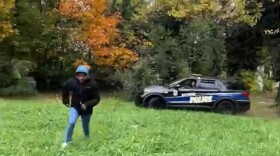Baltimore Police Officer Robert Parks faces attempted murder, assault, misconduct and reckless driving charges after a viral video showed him trying to run over a civilian with his squad car.
The incident, which took place last month, shows Parks speeding toward a Black man following a brief interaction. Eventually he crashes the cruiser into a backyard fence.
Police have not released dashcam or body-worn camera footage of the encounter.
State’s Attorney Ivan Bates announced the criminal counts Wednesday, saying investigators reviewed multiple camera angles, including footage unavailable to the public, before charging the officer.
When asked about the footage, Bates spoke candidly, noting his comments reflect his personal views as a city resident.
“This fool done lost his mind,” he said while chuckling. “We see a lot of video and sometimes you see something that's just so egregious you cannot understand how an individual would place himself in such a position.”
He added the indictment is not a finding of guilt, and that those charged are presumed innocent until proven guilty in a trial.
Parks turned himself in and has been suspended without pay as of Monday.
Baltimore Police Commissioner Richard Worley and Mayor Brandon Scott issued a joint statement, following the indictment announcement.
“This officer’s actions were unacceptable, and completely at odds with how we expect our public servants to act. If convicted, the officer will be fired immediately, in accordance with the law,” they wrote.
According to Bates, the encounter began as a routine dispersal of people loitering outside of Wylie Liquors Bar in Central Park Heights.
"It's getting a little hot, guys. I just need you guys to take a lap," Parks said to individuals standing outside the business. He called out one man by name who had a misdemeanor warrant and repeatedly told him to come over.
When the man refused and walked away, Parks jumped in his patrol cruiser in pursuit.
Bates said the officer’s actions violated department rules and the law, emphasizing that an officer should de-escalate and preserve the sanctity of human life.









